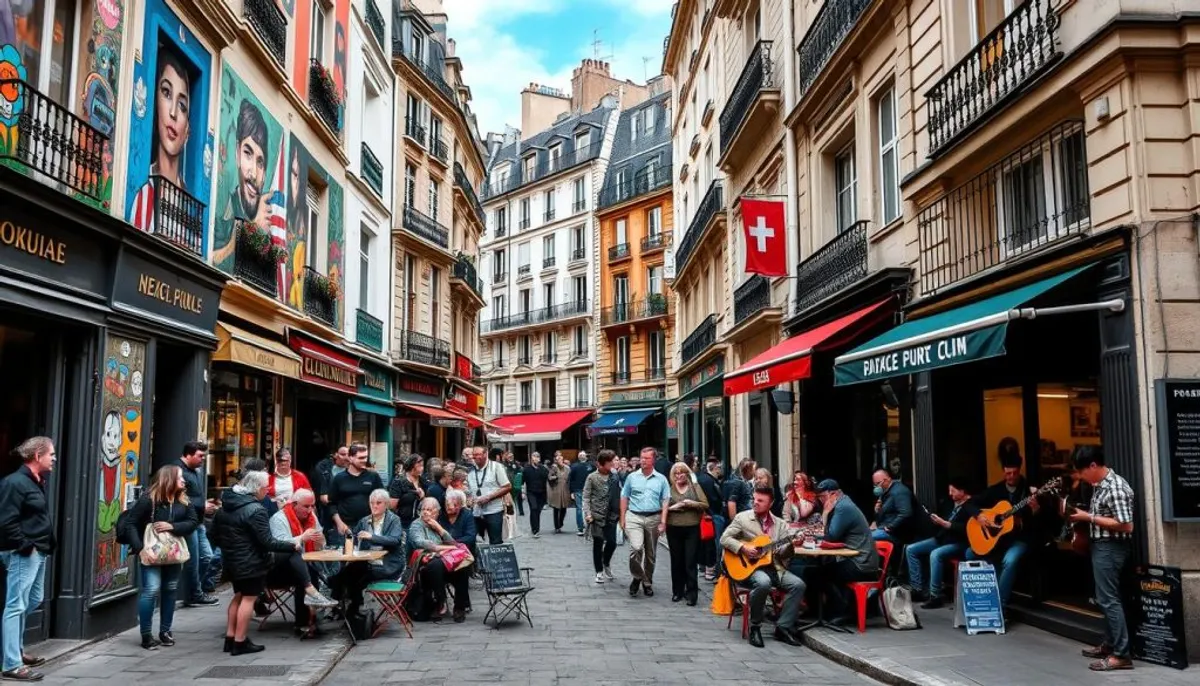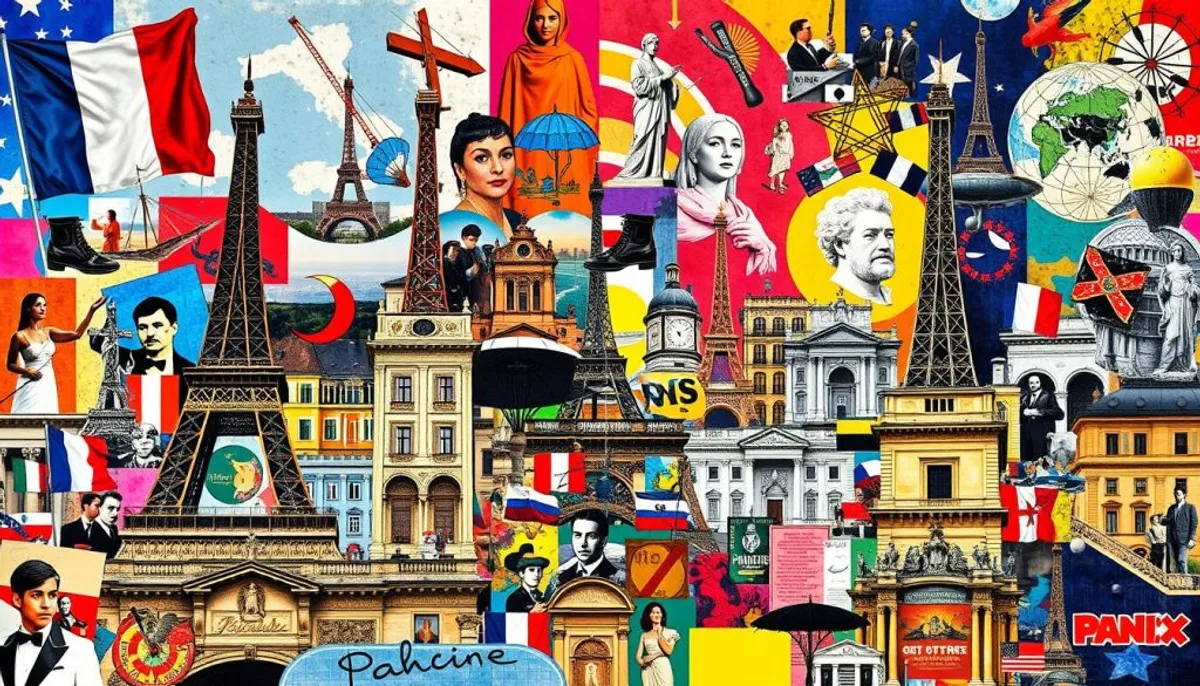France is undergoing a cultural revolution. The “Culture Wave,” a global phenomenon, is sweeping through the Hexagon. The Hallyu, or Korean wave, is captivating the French audience. It influences music, TV series, and even gastronomy.
The French artistic scene is enriched by these emerging trends. The success of “Squid Game” and “Parasite” demonstrates the growing impact of Korean culture. This fusion creates a dynamic and varied cultural landscape.

The numbers speak for themselves. In 2022, South Korean cultural exports reached $10.8 billion, an increase of 6.3%. Korean pop culture has been on a meteoric rise for twenty years. It dominates search engines, a sign of its growing appeal.
This cultural wave is transforming the French media landscape. It brings new perspectives and enriches cultural diversity. France, a welcoming land for these influences, sees its own cultural identity evolve and enrich.
The Emergence of Hallyu in France and Its Cultural Impact
The Hallyu, or Korean wave, has captured the hearts of the French. Born in Asia in the 1990s, it has gained global traction, transforming the French cultural landscape, notably through the general culture BTS exam.
The history of the Korean wave
K-pop and K-dramas have been the pioneers of this cultural revolution. In 2012, “Gangnam Style” by Psy marked a turning point on YouTube, paving the way for groups like BTS. Today, these artists fill the largest French venues.
The influence on French media
French media have reacted to this enthusiasm. Netflix France, for example, is enriching its catalog with Korean series. “Squid Game” set an audience record, demonstrating the growing interest in Korean cinema.
The adaptation of Korean content for the French audience
The Korean entertainment industry has adapted to the French market. Quality subtitles and dubbing make K-dramas more accessible. This cultural adaptation extends well beyond screens, influencing fashion, cuisine, and beauty.
| Field | Impact in France |
|---|---|
| Music | Sold-out K-pop concerts |
| TV Series | Success of K-dramas on platforms |
| Cinema | Increase in Korean film releases |
| Fashion | Influence on clothing trends |
Culture Wave: The Phenomenon of Cultural Remix
The cultural remix is transforming our society. This trend reflects a desire for authenticity and innovation. It manifests through various artistic and social expressions.
The “Resist” movement in modern culture
Cultural resistance is gaining momentum. 61% of online consumers recognize the role of brands in social good. This movement translates into a questioning of established norms.
The “Retrograde” trend and the return to traditions
Retro culture is gaining ground. 68% of people appreciate retro content. 57% of families practice ancestral traditions. This trend is reflected in music, fashion, and art.

The importance of “Reglocalize” in cultural identity
Glocalization plays a crucial role in cultural identity. It combines global and local elements. 65% of consumers are open to innovative businesses. This approach allows for the preservation of authenticity while embracing modernity.
| Trend | Percentage | Impact |
|---|---|---|
| Resist | 61% | Recognition of the social role of brands |
| Retrograde | 68% | Appreciation of retro content |
| Reglocalize | 65% | Openness to innovative businesses |
These trends are shaping our cultural landscape. They influence artistic creation, consumption habits, and social interactions. The cultural remix continues to evolve, reflecting the changing aspirations and values of our society.
The Korean Entertainment Industry in France

The Korean creative industry is booming in the French entertainment market. Phenomena like Squid Game, Parasite, and BTS are revolutionizing cultural consumption in France. This cultural export is radically transforming the landscape.
K-pop is a symbol of this success. In 2022, South Korean record sales reached 213 billion euros globally. France ranks among the top ten buyers. Concerts by groups like BTS generated impressive economic revenues, exceeding $3.6 billion for Korea.
Korean series, or K-dramas, are attracting the attention of the French. Netflix, for example, makes these subtitled contents accessible, propelling titles like “Squid Game” to the top of global rankings. Popularity extends to webtoons, with “Solo Leveling” selling 1.2 million copies in France since 2021.
Korean influence extends beyond entertainment, impacting gastronomy, video games, and K-beauty. Korean has become the 7th most learned language on Duolingo in 2021. This shows the growing enthusiasm for this culture in France.
This Korean wave, or Hallyu, is a unique case study in France. This country, without pre-existing cultural affiliations with South Korea, showcases the power of South Korean soft power. It demonstrates its ability to conquer the French entertainment market.
The Government Strategy Behind the Success
The cultural radiance of South Korea is not by chance. Since the 1990s, the country has adopted a vast cultural policy to enhance its global image.
The strategic investments of the South Korean state
The financial crisis of 1997 was a turning point. South Korea then invested heavily in the cultural industry. This support fostered the development of cinema, music, and television series. The international success of “Parasite,” awarded an Oscar in 2020, is a shining testament to this.
The role of chaebols in cultural expansion
The chaebols, these Korean economic giants, have been essential in this expansion. They have invested massively in creative industries, thus fostering a true cultural exchange. Thus, K-pop and Korean dramas have gained the world. The success of BTS is a glaring example of this achievement.
Cultural diplomacy and Korean soft power
South Korea has transformed its culture into a tool of soft power. A government has created a commission to improve the country's image. This approach relies on events like the Busan International Film Festival and the appointment of BTS as ambassadors for the 2030 World Expo. This strategy has made Hallyu a global phenomenon, recognized even by the Oxford English Dictionary.
Conclusion
The Culture Wave, driven by Hallyu, has revolutionized the French cultural landscape. It demonstrates the importance of a well-thought-out cultural strategy. Since 1999, Hallyu has seen its popularity grow exponentially. It contributed 0.2% of the Korean GDP in 2004, reaching $12.3 billion in 2019.
This cultural wave transcends Asia, reaching France and the world. It manifests through K-pop, Korean dramas, and Korean cuisine. The interest in Korean language and beauty standards shows the extent of this exchange.
Globalization is essential to this cultural expansion. It allows for the rapid dissemination of content. The future of the Culture Wave is promising but raises questions about cultural identity in an interconnected world. This wave continues to transform the global cultural landscape, offering new perspectives for international cultural exchange.
RelatedRelated articles


